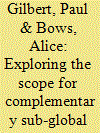|
|
|
Sort Order |
|
|
|
Items / Page
|
|
|
|
|
|
|
| Srl | Item |
| 1 |
ID:
116745


|
|
|
|
|
| Publication |
2012.
|
| Summary/Abstract |
For a high probability of avoiding dangerous interference with the climate system, all sectors must decarbonise over coming decades. Although shipping is an energy efficient transport mode, its emissions continue to grow. Compounding this, the sector's complexity, exclusion from emission inventories and slow progress towards a mitigation strategy, limit drivers towards meaningful change. Whilst there remains a preference within the industry for global mitigation policies, the urgency of required emission cuts necessitates exploration of complimentary sub-global measures. The debate surrounding such measures tends to focus on apportioning global shipping emissions to nations. To explore the policy implications of apportionment, the UK is used in this paper to illustrate how available apportionment regimes produce a wide range of emission estimates. Moreover, in the absence of transparent fuel consumption and freight data, they have limited sensitivity, rendering them currently obsolete for monitoring purposes. Nations, regions and organisations influence shipping, particularly in relation to operations, yet debate surrounding apportionment has arguably delayed consideration of sub-global polices and indicators. This paper makes a case for putting the apportionment debate aside in the short-term to open out the full span of options, consider influence over aspects of the shipping system, and how to monitor success.
|
|
|
|
|
|
|
|
|
|
|
|
|
|
|
|
| 2 |
ID:
069488


|
|
|
|
|
| Publication |
Edinburgh, Edinburgh University Press, 2003.
|
| Description |
xii, 164p.
|
| Standard Number |
0748616144
|
|
|
|
|
|
|
|
|
|
|
|
Copies: C:1/I:0,R:0,Q:0
Circulation
| Accession# | Call# | Current Location | Status | Policy | Location |
| 046992 | 303.625/GIL 046992 | Main | On Shelf | General | |
|
|
|
|
| 3 |
ID:
133000


|
|
|
|
|
| Publication |
2014.
|
| Summary/Abstract |
The UK has legally binding renewable energy and greenhouse gas targets. Energy from biomass is anticipated to make major contributions to these. However there are concerns about the availability and sustainability of biomass for the bioenergy sector. A Biomass Resource Model has been developed that reflects the key biomass supply-chain dynamics and interactions determining resource availability, taking into account climate, food, land and other constraints. The model has been applied to the UK, developing four biomass resource scenarios to analyse resource availability and energy generation potential within different contexts. The model shows that indigenous biomass resources and energy crops could service up to 44% of UK energy demand by 2050 without impacting food systems. The scenarios show, residues from agriculture, forestry and industry provide the most robust resource, potentially providing up to 6.5% of primary energy demand by 2050. Waste resources are found to potentially provide up to 15.4% and specifically grown biomass and energy crops up to 22% of demand. The UK is therefore projected to have significant indigenous biomass resources to meet its targets. However the dominant biomass resource opportunities identified in the paper are not consistent with current UK bioenergy strategies, risking biomass deficit despite resource abundance.
|
|
|
|
|
|
|
|
|
|
|
|
|
|
|
|
|
|
|
|
|